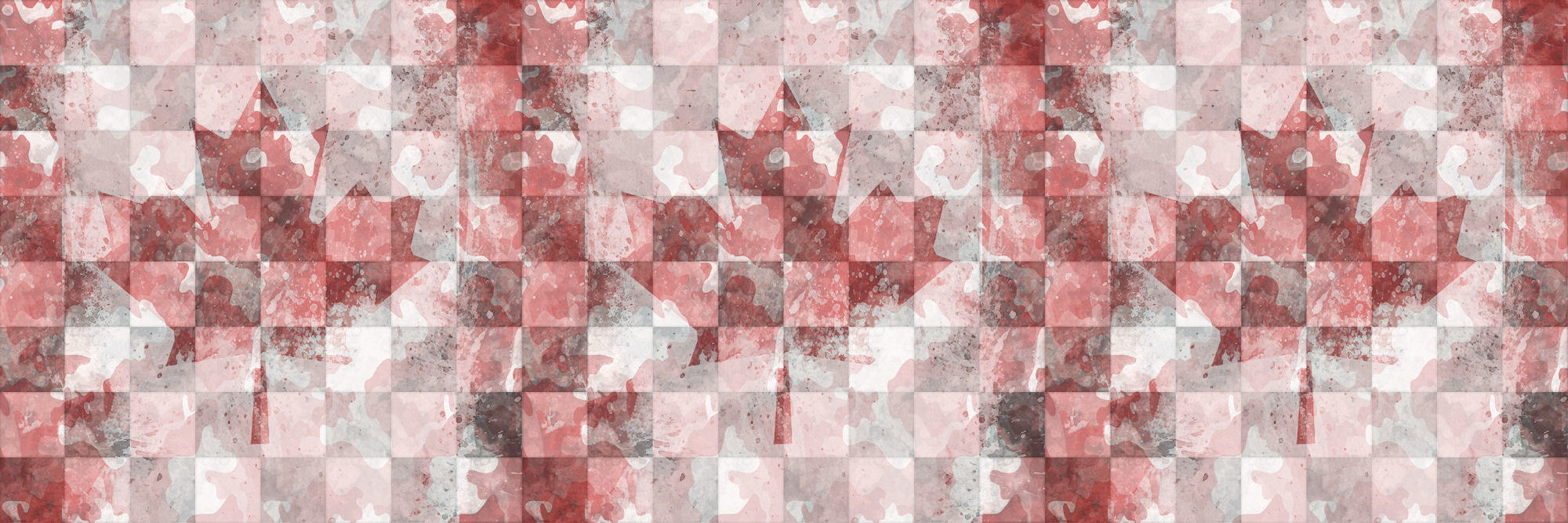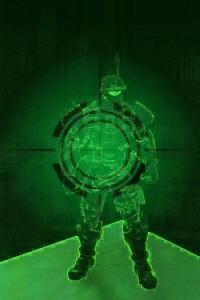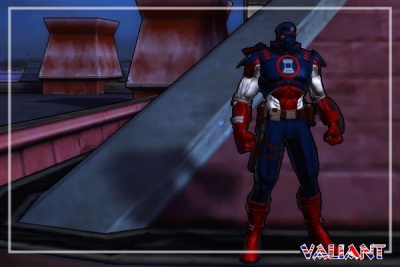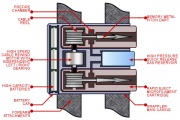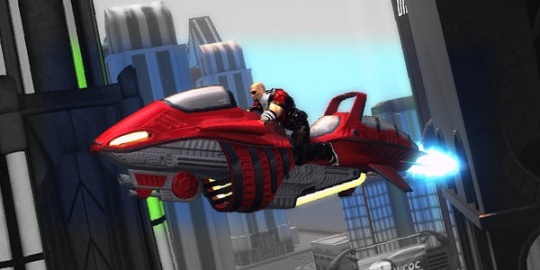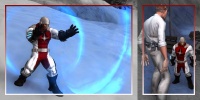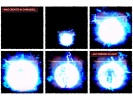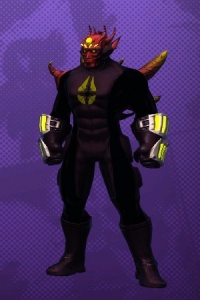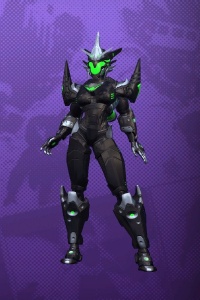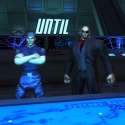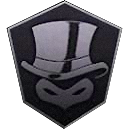Beginnings...
Warren was born on June 30th 1976 at White Horse General Hospital on the banks of the Yukon River to Lucas and Elizabeth McKenzie. Lucas McKenzie was a Corrections Officer at the nearby Wolf Creek Juvenile Corrections Centre, while Elizabeth (a US Citizen by birth) was a Primary School Teacher. Warren's childhood and teenage years were mostly uneventful except for the death of his father in a traffic collision.
Warren and his father were returning from a weekend hunting trip when their truck was sideswiped by a logging trailer causing their vehicle to tumble off the narrow road into the surrounding woodland. Warren escaped the wreck with only minor lacerations. This narrow escape and the loss of his father caused Warren to retreat into himself, becoming something of a loner. He found it difficult to make and maintain close friendships for fear that he would experience more loss.
The events of July 1992 - destruction of Detroit and partial destruction of neighbouring Canadian city, Windsor - had a major effect on Warren. Shaken out of his melancholy by the damage and loss of life on such a grand scale, Warren made a decision that would change the course of his own life forever.
A Soldier's life for me...
At the age of 17 (and with his mother's permission) Warren applied for and was accepted into the Canadian Military. After showing a natural aptitude with firearms during basic training, Warren was earmarked by an unknown officer for deployment to the Special Weapons Detail.
Due to his outstanding results at training, Warren was encouraged to continue his formal education alongside his military training in order that he could gain a commission in the future. Following the advanced weapons training with the Special Weapons Detail; Warren was assigned to Joint Task Force-2; Canada’s elite anti-terrorism unit (the equivalent of the US Army Delta Force or the British SAS).
Warren continued to show an almost preternatural ability with weapons, and was soon topping the ratings in the JTF-2 firing range. His unknown benefactor continued to influence Warren's career behind the scenes leading him to be co-opted for several overseas operations.
Operations of JTF-2 are still classified and so have been redacted from public records of Warren's service history.
Service History...
Promotion - Corporal [1993 Dec 17]
Following Completion of Special Weapons Training and first deployment
- Operation RECORD [1994/1998/2000/2001]
- Canadian support to the United Nations Iraq-Kuwait Observer Mission (UNIKOM)
Promotion - Master Corporal [1994 Nov 30]
- Operation PALLADIUM [1995/1996]
- Contribution to the NATO Stabilization Force in Bosnia-Herzegovina
- Operation STANDARD [1996]
- Support to United Nations Support Mission in Haiti (UNSMIH)
Promotion - Sergeant [1996 Aug 15]
- Operation STABLE [1996/1997]
- Support to United Nations Support Mission in Haiti (UNSMIH)
- Completion - B.S. Management (2:1) [1997 Jun 30]
Promotion - Second Lieutenant [1998 Jan 24]
Following Completion of Officer Training
- Operation REPTILE [1999/2000]
- Canadian peacekeeping contribution to the United Nations Mission in Sierra Leone (UNAMSIL)
Promotion - Lieutenant [2000 Sep 30]
- Operation TOUCAN [2000/2001]
- Peacekeeping support to the International Force in East Timor and United Nations Transitional Administration in East Timor (UNTAET)
- Operation APOLLO [2001]
- Operations in support of the United States in its military operations in Afghanistan.
- Operation ATHENA [2001]
- Canadian deployment with the International Security Assistance Force in Afghanistan
Promotion - Captain [2001 January 31] - Transfer to command of Major General Brock, Special Projects.
Operation Checkmate...
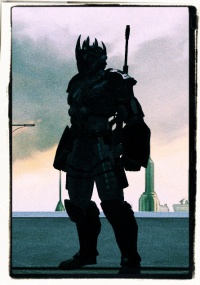
Early shot of Rook's battle armor
While in Afghanistan in 2001, Warren was approached by a Major General Brock. Brock had been charged with forming a covert team of military specialists to fight the growing menaces which were appearing in Canada almost daily it seemed. Whether super powered villains attracted to Canada by the likes of VIPER and ARGENT or alien invaders, the Military was not willing to leave the defense of the nation to the handful of so called Super Heroes which called Canada home. Intrigued by this new challenge, Warren readily agreed to join the team. Strings were thus pulled and Warren soon found himself stationed near the small Manitoba town of Churchill on the western shore of Hudson Bay.
Fort Churchill is an Arctic site on Hudson Bay with a rail link. It is near the point of maximum auroral activity. This combination of circumstances made it ideal for far-north sounding rocket launches. Initially used by the Canadian Army in 1954, construction of more elaborate facilities in support of the International Geophysical Year began in 1956. The range was closed again in December 1958 after the IGY program ended. It was reopened again in August 1959 by the US Army as part of its network of sounding rocket stations. This allowed use of the site by other groups over the years. In late 1960 a fire largely destroyed the facilities at Fort Churchill. When the United States decided to end its activities at Churchill by June 1970, the Canadian National Research Council took over operations to support the Canadian Upper Atmosphere Research Program. The Canadian military also found the site useful for characterization of the ionosphere for military communications.
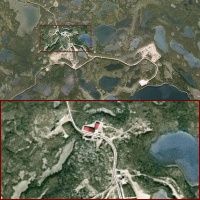
Fort Churchill / Operation Checkmate
By the 1990's the facility was inactive and various attempts to revitalize it failed. It was at this point that the Canadian Army chose to use the site as a base for several of it's covert projects. The majority of the new base was built underground with only several small structures at ground level to give any indication of habitation. The movement of people in and out of the site was explained as chemical and fallout testing due to the checkered history of the site. In late 2000 use of the site was allocated to Major General Brock for Operation Checkmate.
Brock began his monumental task by setting up his operations team and tasking them with reviewing the best and brightest that the Canadian Military had to offer, alongside collating as much information on threats to Canadian soil as they could beg, borrow or even steal. By the end of the year Brock was ready to begin assembling his first team.
Alpha Team Leader
Code: KingRank: Colonel, Army
Name: Jean-François Lévesque
Place of Birth: Quebec
Aerial Surveillance & Assault
Code: Queen Rank: Major, Air Force
Name: Nicole Reuben
Place of Birth: Toronto
Ground Surveillance & Assault
Code: RookRank: Captain, Army
Name: Warren McKenzie
Place of Birth: Yukon
Strategist & Explosives
Code: KnightRank: Lieutenant, Army
Name: Ruth Levy
Place of Birth: Israel
Intelligence & Extraction
Code: BishopRank: Sub-Lieutenant, Navy
Name:Jacques Dumbrille
Place of Birth: Ontario
All members of the team were supplied with equipment suitable to their role, including an advanced battle armor customised to each person's skills. For example, Rook's armor provided him with advanced stealth capabilities, while Queen's flight suit allowed her much greater agility than any plane she had flown.
Initially the team proved to be successful working together well to uncover and remove several VIPER bases. Shortly however it seemed that VIPER began to anticipate their moves, and so each time they arrived at a targeted location they found it empty. Although Brock conducted an intensive investigation no evidence of infiltration of Checkmate by VIPER operatives. Details of missions were nevertheless restricted to senior personnel and to the team itself. As the string of failed missions continued to run on, tensions between team members began to rise. Despite not wishing to distrust their comrades each began to suspect one of the others of inadvertently or deliberately letting details of their operations slip.
The situation came to a head finally in the summer of 2001. After arriving at what appeared to be yet another in a long series of suspiciously empty warehouses, the ground team were attacked from the air by a volley of anti personnel missiles. Missiles which had been specifically tailored to pierce the Checkmate armor. Always quick on his feet, Rook had managed to shield himself somewhat but as he lay battered under the bodies of his fallen team mates, his sight blurred by blood from his own wounds he caught a glimpse of their attacker before slipping into unconsciousness. An attaker wearing a rather unique Checkmate Flight suit.
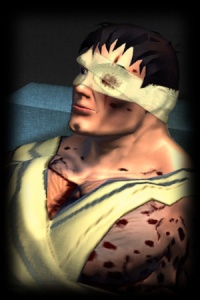
Rook recovers from his injuries
Some days later, Rook awoke in a small hide covered tent. Raising his hand to his aching head he found the left side of his face bandaged tightly with heavy padding over his eye. His right eye was unimpeded however and he began to take in his unfamiliar surroundings as a deep growl of a voice behind him said gruffly
"We found you crawling in the forest at edge of our hunting grounds. I have done what I can for your wounds." Rook struggled to turn around but found his body refused to budge more than a few inches, and he was forced to reply to the disembodied voice,
"My Team Mates?" he asked, dreading the answer.
"We found none alive. We buried them near where they fell to prevent animals disturbing the remains. When you regain your strength perhaps you will be able to tell us what happened." The speaker returned to a position in Rook's line of sight, and the injured soldier was shocked to learn that his saviors were in fact Sasquatch, creatures he had long ago dismissed as myth.
Feeling that he was no longer fit for military service, Rook perhaps remained in Chiyetanka longer than was necessary for physical recovery. The quiet routine of the Sasquatch appealed to him. Over the next few months as Rook recovered from his wounds, he lived and worked with the Sasquatch in their hidden village in what he learned was called Chiyetanka Bluff. Although the majority of his wounds healed leaving only light scars to indicate any damage had been done; his left eye was gone, lost to shrapnel from the attack. Despite this obvious disability the Sasquatch encouraged Rook to accompany them on hunting raids. The monotone surroundings and drifting snow meant Rook's lack of depth perception was less of a hindrance than he thought it would be and he soon learned to compensate sufficiently that he was rivaling his hosts' best hunters.
The Valiant Few...
Going Home...

